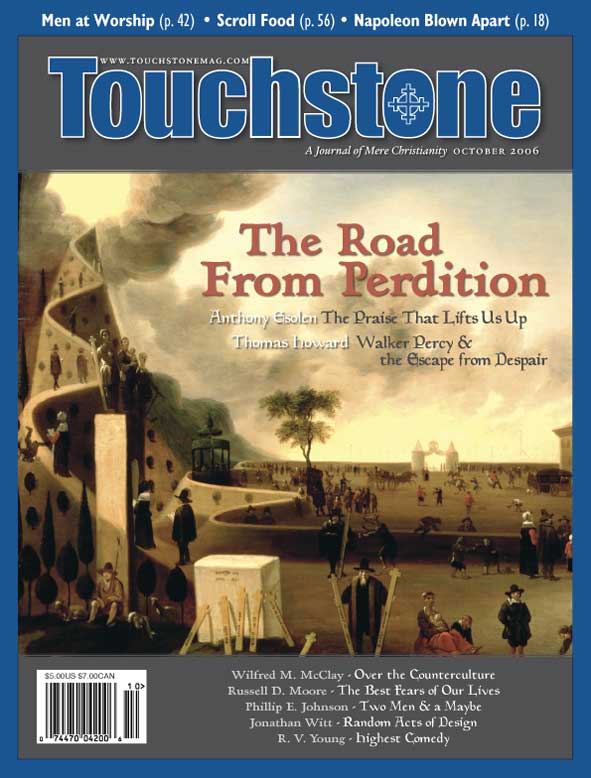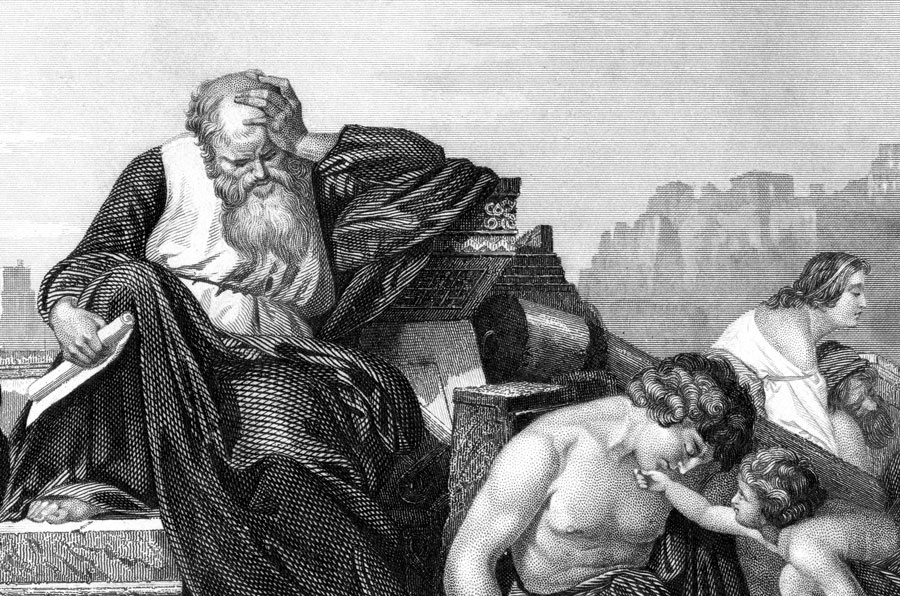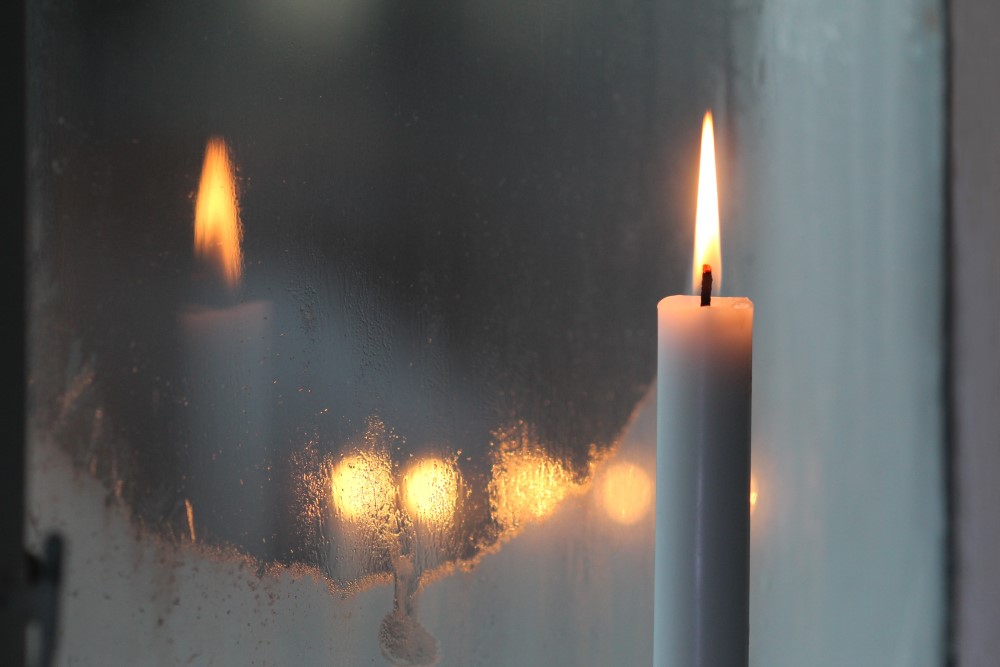View
Over the Counterculture
Wilfred M. McClay on Transgressive Bohemians as Regressive Bobos
When future historians look back at our own era, one of the oddities they will surely notice is the peculiarly exalted status of the idea of “counterculture.” Indeed, a self-consciously countercultural ethos has become dominant among college-educated and culturally aspirant Americans. This observation was at the heart of journalist David Brooks’s hilarious but also thoroughly accurate depiction of the “bourgeois bohemian” in his book Bobos in Paradise.
Not so long ago, the quest for liberation from social convention carried certain perils. But now we have made that quest into a new social convention in its own right, with its own canons of respectability, such as the routine celebration of books and movies and other works of art solely on the grounds that they are “troubling” or “transgressive,” qualities now deemed to be peculiarly meritorious in and of themselves, quite apart from their specific content.
Of course, one of the many dirty little secrets of this dirty little ethos is that it rests upon a veiled form of class snobbery. There must always be certain unnamed “others,” the gaping suburbanites and mindless rubes who are thought to sustain and uphold the philistine conventions from which “we” perpetually need to be liberated. But those “others” seem increasingly shadowy and hard to locate. The specter of a monolithic “red state” America is an easy way of positing the continued pernicious existence of such benighted “others.”
But as a resident of a certifiably red state, I can authoritatively testify that we are all Bobos on this bus—or at least most of us. The new convention has been triumphant beyond its wildest dreams, and now suffuses our popular culture and our advertising, assimilated into the mainstream in the most remarkable and incongruous ways.
Bobos Ascendant
One sees this cultural ascendancy of the countercultural in any random hour of television viewing, or by flipping aimlessly through the New York Times, the locus classicus of all things Bobo. One representative day last year, for example, the dutiful Times reader scanning the front page of the Arts section would have encountered two representative articles.
The first is a hip-earnest piece on the recognition of skateboarders as a “subculture,” a classic bit of Bobo pop-culture-slumming and identification-with-the-“marginalized,” and just the sort of posturing that one has come to expect from the Grey Lady in the era of “Pinch” Sulzberger. The other is an equally earnest story about the creation of a “Museum of the Counterculture” in Manhattan’s East Village by filmmaker and pizza-chain owner Phil Hartman, a man described as “an entrepreneur whose main form of transportation is his bicycle”—an assertion that I suspect the Times never fact-checked.
Like any good Bobo, Mr. Hartman dutifully makes a show of feeling just a little bit guilty about his proposal. He is anxiously aware that “the idea of institutionalizing downtown culture” has “inherent contradictions in it,” and indeed the idea has aroused some bitter opposition. But even the opponents bring an unmistakably Bobo flavor to their objections.
There is, for example, the film-archivist neighbor who complained, vehemently, that “we are not counterculture. We in the East Village are the culture and everything around us is the opposite of culture.” He imagines himself to have effected a kind of post-Copernican revolution, rendering the word “counterculture” itself obsolete, and placing the East Village, rather than the sun, at the center of the universe. The red-staters don’t have a different culture, they simply lack any culture at all. We, quite literally, are the world.
Another example. I recently stayed in a meticulously restored Victorian inn in the meticulously restored Victorian town of Cape May. Two ex-artists, refugees from the East Village, run the inn, and throughout the house display their utterly predictable “cutting edge” works (cutting-edge circa 1920, that is). They even posted a tasteful little sign “warning” guests that some images might be “disturbing.”
Wilfred M. McClay holds the SunTrust Chair of Humanities at the University of Tennessee at Chattanooga, and is the author of The Masterless: Self and Society in Modern America (North Carolina) and A Student's Guide to U.S. History (ISI Books). He is a member of the Presbyterian Church, U.S.A.
subscription options
Order
Print/Online Subscription

Get six issues (one year) of Touchstone PLUS full online access including pdf downloads for only $39.95. That's only $3.34 per month!
Order
Online Only
Subscription

Get a one-year full-access subscription to the Touchstone online archives for only $19.95. That's only $1.66 per month!
bulk subscriptions
Order Touchstone subscriptions in bulk and save $10 per sub! Each subscription includes 6 issues of Touchstone plus full online access to touchstonemag.com—including archives, videos, and pdf downloads of recent issues for only $29.95 each! Great for churches or study groups.
Transactions will be processed on a secure server.
more on culture from the online archives
more from the online archives

37.5—Sept/Oct 2024
Why Law Schools Can't Teach Law
A sidebar to How Law Lost Its Way by Adam MacLeod
calling all readers
Please Donate
"There are magazines worth reading but few worth saving . . . Touchstone is just such a magazine."
—Alice von Hildebrand
"Here we do not concede one square millimeter of territory to falsehood, folly, contemporary sentimentality, or fashion. We speak the truth, and let God be our judge. . . . Touchstone is the one committedly Christian conservative journal."
—Anthony Esolen, Touchstone senior editor












